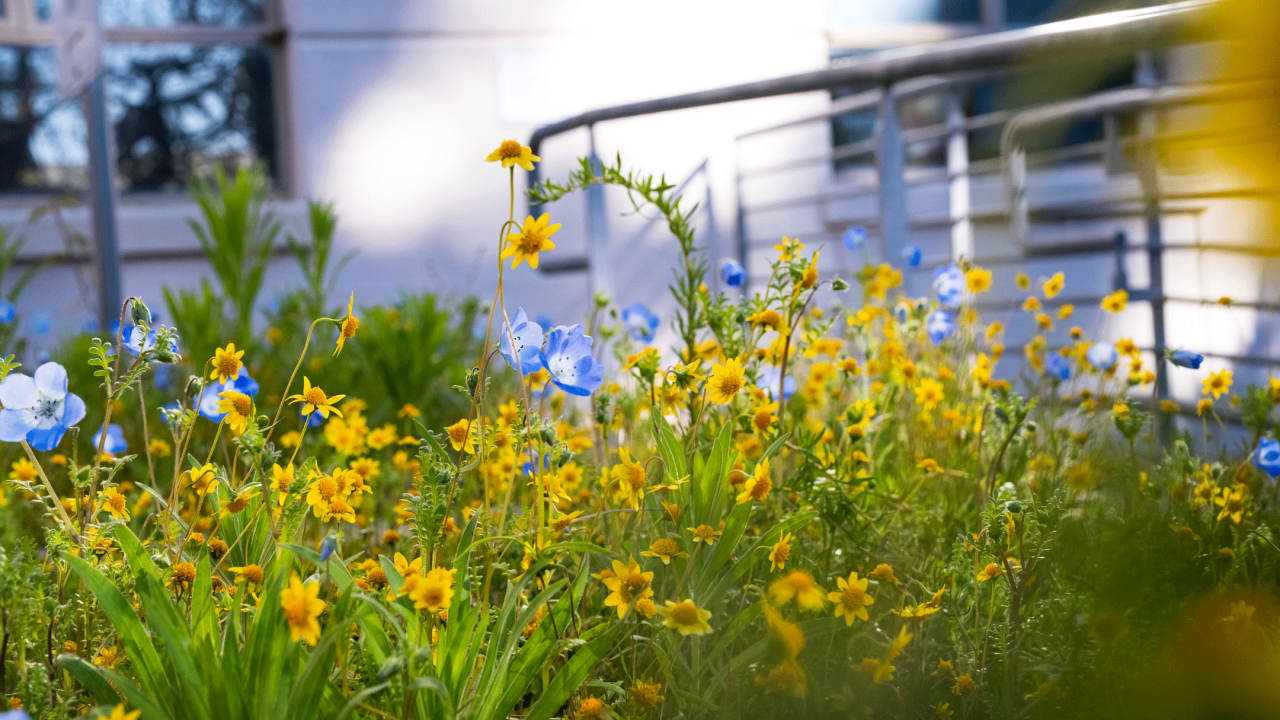
UC Davis Students Aim to Bring More Native Plants to Campus
Davis Rewilding Society converts neglected spaces into native habitat gardens

Follow the Davis Rewilding Society on Instagram
When UC Davis student Madison “Madi” Burns joined the Davis Rewilding Society during her freshman year, it helped bring her future into focus. The second-year landscape architecture major said she has developed a much better understanding of the importance of native plants from her involvement with the student-run organization.
“Being part of the club has really expanded my knowledge and has made an impact on what I want to do with my life and my career,” Burns said. “I want to design spaces to incorporate native species.”
The Davis Rewilding Society was founded in 2021 by students Madeline Laun, landscape architecture major, and Kees Hood and Dylan Sommer, both evolution, ecology and biodiversity majors, with a mission to bring more native plants to campus and teach others about the flora’s importance in the face of a changing climate and the many ecological benefits.
“Native plants are well adapted for our climate and many species can get by on rainfall alone once they are established,” Hood explained. “I think the current movement towards drought tolerant landscaping is a chance for us to embrace native plants.”
The student club has converted several neglected spots on campus into thriving native habitat gardens, including overhauling the space surrounding Bowley Hall that was overrun with invasive grasses. Sommer said about 30-40 volunteers got together to weed, mulch and plant a variety of low maintenance species.

“We chose some cultivars of ceanothus and manzanita, California bee plant, valley oak, Bolander’s phacelia and silver lupine, among others,” Sommer said.
Planter boxes outside the main entrance to Hunt Hall were also spruced up with plants that are on-brand for UC Davis, showing off vibrant blue and yellow flowers.
“I’ve been popping by most days, and you’re almost always guaranteed to see a bumble bee or ladybug there,” Burns said.
Hood said that the Tri Co-ops Habitat Enhancement Project, which included transforming approximately 3,000 sq. ft. of outdoor space, was one of the group’s biggest projects to date. The area is adjacent to the Sprocket bike circle and gets a lot of pedestrian and cyclist traffic, so it was important to the group that they bring in eye-catching native plants, including Golden Lupine, an annual yellow wildflower.
“It was important to ensure the project will look attractive and draw in passersby to learn more about the native plants that line the route of their commute to class,” Hood said.
Each project they take on requires plants, tools and volunteers to be successful. The Davis Rewilding Society has surpassed its initial $2,500 goal they set for its UC Davis Crowdfund campaign and are now trying to reach their stretch goal of $3,500. They plan to use the funds to buy seeds and plants from local nurseries, necessary gardening tools and to be able to supply food and water to their hardworking volunteers.
Students with the organization believe that the UC Davis community can work together to "rewild" the spaces that surround us.
“This year, we’ve been feeling a lot of love and our organization has grown so much,” Burns said. “It’s been inspiring to see how many people care about this issue.”
Media Resources
- Madi Burns, Department of Human Ecology, mgburns@ucdavis.edu
- Tiffany Dobbyn, College of Agricultural and Environmental Sciences, tadobbyn@ucdavis.edu